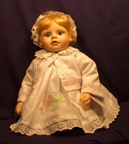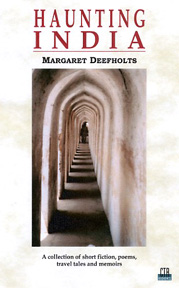ZARINA'S
DOLL
A tale about
a Calcutta slum urchin,
a cynical shop owner and
a doll in his window. The tale explores a relationship which leads the
wealthy merchant to a deeper understanding of the universal human need
for love and compassion
regardless of the barriers of class and social privilege.
An Excerpt from Haunting India

by
Margaret Deefholts
"The
first time I saw the child, she was pressed to the shop window, her nose
flattened against the glass, her breath fogging the surface. "You...go
away!" I yelled.
She turned towards me, her black eyes enormous in her small pointed face.
"Go on!" I shouted, gesticulating. "Move!"
Her mouth rounded in an "O" and then she was off, scurrying
like a small brown mouse along the sidewalk, towards the shanty settlement
further down the street.
Muttering under my breath, I wiped her sooty fingerprints from the display
window. Slum children. Cheats. Pick-pockets. I glanced at the cluster
of huts. It was one of many such communities peopled by refugees from
war-torn Bangladesh pouring in by the hundreds of thousands across the
Indian border.
Five years ago, this had been a respectable neighbourhood. No longer.
The area, like much of Calcutta, was an open sore - pockmarked with hovels
made of tar, tin, gunny and cardboard. People, thin maggots of humanity,
crawled between the shacks, feeding off the city's detritus. No water,
no toilets; the very old and the very young dying of disease or starvation,
the rest begging, thieving or peddling drugs.
Yet despite the location, business was good. "Sen's Toy Emporium",
known colloquially as 'STE', was the largest chain of toy stores in India
with branches in Delhi, Bombay and Madras. It was a family business and
our selection ranged from electric train sets, collectors' editions of
model cars and electronic games, to hand-carved wooden soldiers and dolls.
Dolls, in fact, were our specialty. They filled three rooms-dolls that
walked, talked, wept, laughed, sang and danced; china dolls, wooden dolls,
dolls made of silk and dolls made of straw, dolls with hand-painted faces
and dolls with ermine edged cloaks and ruffled skirts. Our finest dolls
were imported from London, New York, Paris, and Vienna; others came from
Japan, Mexico and Guatemala.
* * * * *
Next
morning when I arrived at the store, the ragged urchin had re-appeared.
She sat on the edge of the sidewalk, watching the passersby.
"Don't you touch my windows," I said as I rolled up the blinds.
She wiped her snotty nose with the back of her hand.
Seated at my desk beside the shop window, I Looked out at the street a
couple of hours later. The child was still there. Not touching the glass
this time, just sitting cross-legged on the dusty sidewalk. She was gazing
open-mouthed at a blue-eyed, flaxen haired baby doll displayed in the
window. A fly crawled across her cheek, but she was so engrossed in examining
the doll's frilly dress and matching bonnet, she didn't wave it away…didn't
even notice it. I scowled and started towards the door, but a customer
came in at that moment, and I forgot about the child. That is, until closing
time. As I pulled down the heavy metal screens I caught a movement out
of the corner of my eye, and saw her scamper off down the street.
The next morning she was back. And the day after that. I stifled my irritation;
after all, she wasn't really doing any harm. Best to ignore her, and sooner
or later she would get bored and move elsewhere.
But a week later, she was still there. Still sitting for hours at a time,
her eyes avidly fixed on the doll, oblivious to passersby. I began to
look for her, even to wonder a little about her. She appeared to be around
ten years old, but was probably an undersized eleven or twelve.
About two weeks after I'd first seen the child, a commotion erupted outside
the shop. Shouting, jeering and thumping noises. I glanced at the window.
No little face there."
![]()
Back
to Haunting India Table of Contents

Back
to Margaret's "Welcome to my Villa" Page